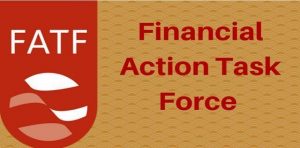Financial Action Task Force (FATF):

The Financial Action Task Force (FATF) decided to retain Pakistan on “increased monitoring list’.
- “Increased monitoring list” is another name for the Grey List.
- The FATF had issued the 27-point action plan after placing Pakistan on the ‘Grey List’ in June 2018. The action plan pertains to curbing money laundering and terror financing.
- During the October-2020 Plenary, due to the Covid-19 pandemic, Pakistan was given an extension for full compliance with the 27-point action plan till February 2021.
- It had then not fully complied with 6 of the 27 directives.
- In February 2021, FATF acknowledged Pakistan’s significant progress in combating terrorism, however it was still to fully comply with three of the 27-point action plan.
- The three points pertained to effective steps in terms of financial sanctions and penalties against the terror funding infrastructure and the entities involved.
- The FATF said Pakistan had failed to take appropriate action against UN-designated terrorists such as 26/11 accused Hafiz Saeed and JeM chief Masood Azhar. However, Pakistan has completed 26 of the 27 action items.
- The FATF encourages Pakistan to continue to make progress to address as soon as possible the one remaining Countering Finance of Terrorism (CFT)-related item by demonstrating that Terror Financing investigations and prosecutions target senior leaders and commanders of UN-designated terrorist groups.
- In addition, the FATF has handed down another 6-point list of tasks mainly on money laundering actions to be completed as well.
- Pakistan is expected to amend its Money-Laundering Act, crackdown on Designated Non-Financial Businesses and Professions (DNFBPs) like real estate agencies and gemstone traders, confiscate and freeze assets of money laundering entities and monitor businesses for proliferation financing, with sanctions for non-compliance.
Financial Action Task Force:
- It is an inter-governmental body established in 1989 during the G7 Summit in Paris.
- The FATF assesses the strength of a country’s anti-money laundering and anti-terror financing frameworks, however it does not go by individual cases.
- Objectives:
- To set standards and promote effective implementation of legal, regulatory and operational measures for combating money laundering, terrorist financing and other related threats to the integrity of the international financial system.
- Headquarters:
- Its Secretariat is located at the Organisation for Economic Cooperation and Development (OECD) headquarters in Paris.
- Member Countries:
- The FATF currently has 39 members including two regional organisations — the European Commission and Gulf Cooperation Council. India is a member of the FATF.
- Lists under FATF:
- Grey List:
- Countries that are considered safe haven for supporting terror funding and money laundering are put in the FATF grey list.
- This inclusion serves as a warning to the country that it may enter the blacklist.
- Black List:
- Countries known as Non-Cooperative Countries or Territories (NCCTs) are put in the blacklist.
- These countries support terror funding and money laundering activities.
- The FATF revises the blacklist regularly, adding or deleting entries.
- Grey List:




